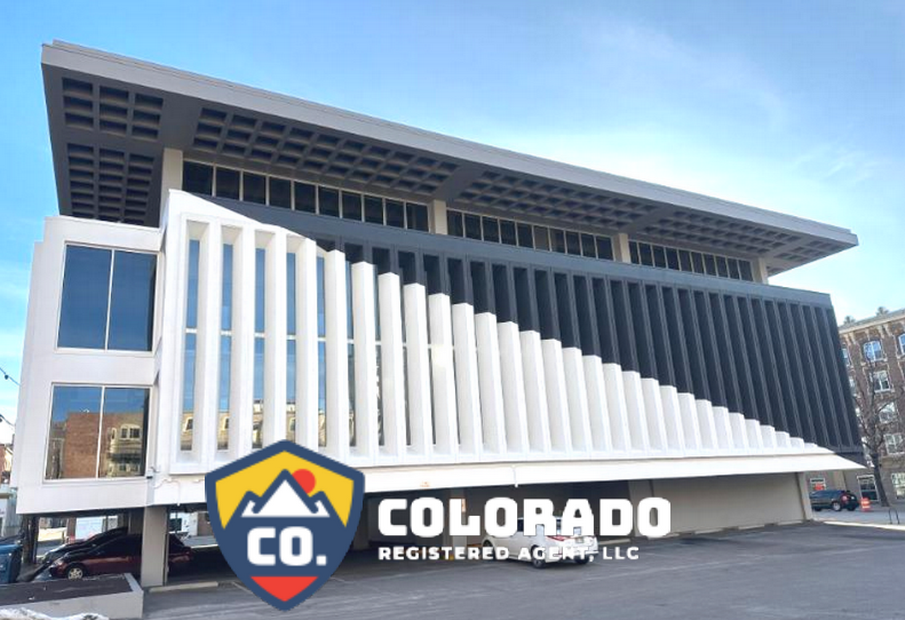
Zoning & Signage Requirements
for Your Colorado Business
How to Get Business Signs for Your Colorado LLC
After you’ve started your Colorado LLC and found a location, it’s time to put up signage to let your customers know where they can find you. While putting up a sign might seem simple, different jurisdictions have different requirements for what kind of signs you can use and where you can put them.
Your company’s sign is one of the more powerful weapons in your business’s arsenal. Good signage helps identify your business, attracts customers, and builds your brand. However, it’s also important that your signs follow your local jurisdiction’s rules so you can avoid potential fines and penalties.
Our building is located in Denver, so we’ve been through this process ourselves. While it may seem a little tedious, taking the time to familiarize yourself with your jurisdiction’s regulations will save you time and money in the long-run.
We’re here to help you navigate Colorado’s signage regulations, zoning laws, and permit requirements so that you create and place your signage correctly the first time:
We Get It
We’re a Colorado business, too. We’re familiar with zoning and signage requirements because we have to abide by them, too. We’ve kept our business up and running for a while, and we’re happy to share what we’ve learned.

We’re located in the heart of Denver, and when you hire us, you can use our business address.

$35 Colorado Registered Agent
With Colorado Registered Agent, it couldn’t be quicker or easier to start and expand your business here in CO. Don’t settle for a cheap alternative. Join over 30,000 business owners who already rely on Colorado Registered Agent!
- $35 Per Year: Our Price Never Goes Up
- Free Business Address in Our Denver Building
- Free Domain Name for First Year
- Website, Email, & Phone Service (90 Days Free)
- Use Our Address & Keep Personal Info Private
- Same-Day Document Delivery System
- Report Reminders & Information Updates
- Cancel Anytime With No Cancellation Fees
- Real Customer Service From Real CO People
Before you get started
Unfortunately, hanging up a sign for your Colorado LLC may not be as simple as it seems. While the state of Colorado, specifically the Colorado Department of Transportation (CDOT), regulates billboards and Electronic Digital Messaging signs (EDMs) along the highway, it will probably be your local jurisdiction that determines the requirements for your business’s signage.
In order to create and implement the correct kind of signage, you’ll need to do some legwork and check in with your local government about their zoning regulations, acquiring the right permits, and the requirements for maintaining your signs.
1. Research local regulations
In general, a zoning permit is required for most exterior signs. Local jurisdictions also sometimes require a sign plan before posting your business’s signs.
For example, here in Denver zoning permits are required for signs located entirely on private property, as well as for signs that are on private property but extend into the public right-of-way (like an awning sign above a sidewalk). Businesses are also required to submit a Comprehensive Sign Plan Application Form and meet with the city’s planning services department before hanging up any signage.
Again, this process varies between jurisdictions, so be sure to check in with your local government about the specifics of their requirements. However, here are some general things you may want to look out for:
- Zoning Restrictions. Not only can signage requirements vary between local jurisdictions, but they can also vary within the jurisdiction, depending on where your business is located. For example, most communities have established historic districts or landmark areas that have stricter signage requirements.
Often, these zoning restrictions will also determine requirements like how big your sign can be, where it can be placed, whether or not it can be illuminated, and what information needs to be included. Some cities, like Denver, also want to know what your sign will be made of, what kind of connections and anchor types will be used to attach it to the building, and other structure-specific information. - Sign Design Requirements. There may also be local regulations about what information needs to be included on your sign, as well as information or imagery that cannot be on your sign. Generally speaking, a business name and logo will work just fine. But some cities, like Colorado Springs, have more specific, aesthetic requirements that will require you to adjust your sign design accordingly.
- Illumination Restrictions. You probably want to make sure your sign is visible, even at night, but make sure you follow the local requirements for illuminating signage. Unfortunately, lighting up your sign may not be as simple as setting up a flood light on a timer.
If you want put up electronic signage, like LED Electronic Digital Messaging signs or neon lighting, your local area will more than likely have stricter regulations and require an extra permit (or two).
2. Check in with your property manager
If you own your own building, you’re solely responsible for making sure your signage follows regulations. However, if you’re renting your office space, your landlord or property manager will be able to tell you what kind of signage you’ll be able to use at your location.
Another thing to keep in mind is that on top of the local zoning requirements, you’ll also need to follow any signage requirements laid out by the building’s owner. It’s a good idea to check your lease for any other owner-specific signage rules, and contact your landlord or property manager about what you can use.
3. Get a permit
Almost all jurisdictions in Colorado require you to get a permit to hang business signage. It’s more than likely, however, that you’ll need to get several. For example, in Denver, if you’re located in a historic district, you have to send an application to Landmark Preservation in order to a Certificate of Appropriateness. A building permit is required in order to install your sign, and an additional electrical permit is required if your sign has electrical components or connections.
Common permits include:
- Signage permit
- Building permit
- Electrical permit
- Landmark permit
- CDOT permits
What are CDOT permits? While the other permits are dictated by local jurisdictions, the Colorado Department of Transportation (CDOT) regulates outdoor advertising along the state’s highway system.
Any signs that are within 660 feet of the highway right-of-way have to follow specific state and federal rules. This includes signs that advertise any activity, service, or product conducted off the property where the sign is located.
You can find a comprehensive list of these rules on the Colorado Secretary State’s website.
4. Make Your Sign
Now that you understand what you can (and cannot) do signage-wise, it’s time to make your sign! Just like every other facet of running your business, you can take the time to design and make your signage yourself or hire a signage company.
There are several perks to hiring a local signage company. Aside from getting a professionally designed sign for your business, most local signage companies will already be familiar with your city’s or jurisdiction’s signage requirements, as well as which kind of sign will work best for your place of business. And more than likely, they’ll also be able to install your sign for you.
Whether you’re doing it on your own or hiring someone, one of the most important factors to consider is what type of signs you’ll want to make and where you plan on putting them.
For example, businesses located in Denver’s historic districts cannot install Vinyl signs (except as window signs affixed to window glass), plastic signs, or signs that are internally illuminated.
Below, you’ll find some examples of signs that businesses commonly use.
Types of signage for your business
Freestanding
- Monument signs
- Banners
- Pole signs
- Billboards
- EMCs
Exterior Building
- Channel letters
- Blade signs
- Storefront signs
- Neon signs
- Awnings
Interior Building
- Wall signs
- Digital signs (like menus)
- Neon & illuminated signs
Window
- Etched glass
- Chalk and/or paint
- Static window clings
- Perforated vinyl decals
It’s important to note that if you do want to design, build, and install your sign yourself, make sure you are careful to follow the jurisdiction’s specific rules as laid out by the required permits to avoid any penalties.
Abiding by zoning regulations and applying for the right permits for your business signs can be a complicated process. And while we can’t hang your signs for you, we can take some of the stress of owning a business off your plate.
When you hire us as your registered agent, we’ll immediately scan, upload, and notify you when you receive important reminders from the state. You’ll be able to access and manage all of your important state paperwork in your online account, making it easy to stay on top of state requirements.
After Your Signs Are Installed
Now that your signage is up and in public view, you will need to make sure you maintain those signs according to your jurisdiction’s requirements.
Maintaining a sign involves everything from making sure lighting is replaced if it goes out, to restoring faded text, to possibly replacing your signage if it’s damaged or if regulations change in your area.
Keep up with your jurisdiction’s requirements
Occasionally, a jurisdiction will update or change signage requirements. You may get a notice from the city ahead of time, but it doesn’t hurt to occasionally check in with your local government to make sure your signage is still compliant.
For example, your city may re-zone the area around your business, making your current neon signs in the building’s front windows no longer legal. If you’re located in an area with growing, high foot traffic, the city may decide that certain street-level signs (like sandwich boards or pole signs) are an encumbrance to pedestrians and are no longer allowed.
Keeping up with your jurisdiction’s requirements is essential to avoiding any potential fines or other legal action that might occur if your signs do not meet regulation.
Maintain your signage
All signage, especially any posted outdoors, is likely to experience general wear-and-tear and damage. On top of potentially violating local requirements, maintaining your company’s sign is essential to your business’s image.
It’s easy to keep an eye on the signs connected to your place of business, but if you have other signs in a different area (like a billboard on the highway or on a monument sign down the road from your business) make sure you check in on them regularly. The last thing you want is a build up of dust or rogue graffiti keeping clients from finding your business, or worse–avoiding your business altogether.
Colorado Business Signage FAQ
The price of your business signage can vary greatly. Some businesses only spend a couple hundred bucks, but more involved signage (billboard, EDMs, large building signs, etc.) can cost thousands. It really depends on where your business is located and what you want.
Generally speaking, the cost of your signs depends on a range of factors, including:
- Permit fees
- Rental/lease fees
- The type of sign
- Sign design
- Lighting
- Maintenance
The price of your business signage can vary greatly. Some businesses only spend a couple hundred bucks, but more involved signage (billboard, EDMs, large building signs, etc.) can cost thousands. It really depends on where your business is located and what you want.
Generally speaking, the cost of your signs depends on a range of factors, including:
- Permit fees
- Rental/lease fees
- The type of sign
- Sign design
- Lighting
- Maintenance
When it comes to getting signs for your business, you have a lot of options. You can design, print, build, and install your sign yourself or you can hire a signage company that can do some, or all, of those things for you.
If you’re going to hire a signage company, it’s always a good idea to hire one with local ties. More than likely, they’ll be more familiar with local zoning and signage requirements, and can help you avoid making common mistakes when creating and installing your sign.
You can encounter some hefty consequences if your business signage does not meet local zoning requirements or if you forgo getting the proper permits.
Just like signage requirements, penalties for not following sign regulations vary between jurisdictions. You may be fined, the city may remove your signs or, worst of all, you might face serious legal action.
Unfortunately, a good sign can be a tempting canvas for graffiti artists. If you do find yourself in a situation where your sign is vandalized, you’ll want to:
- Immediately document the damage and file a report with your local police department.
- Contact your insurance company to file a claim.
- Explore options for repair or replacement. The solution may be as easy as washing your sign, but the damage may also be severe enough to warrant sign replacement.
If your sign is on property you own, you will be responsible for replacement and/or repair. However, if you’re renting the space for your signage, or if your signage is on a building you are renting or leasing, fixing the sign may fall to the property owner.

